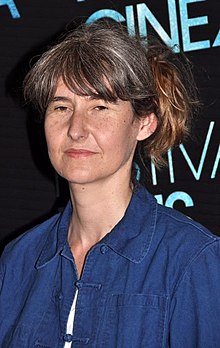Lætitia Masson (born 18 August 1966)[1] is a French film director and screenwriter. She has directed twelve films since 1991. Her film For Sale was screened in the Un Certain Regard section at the 1998 Cannes Film Festival.[2]
Lætitia Masson
| |
|---|---|

Laetitia Masson in 2012
| |
| Born | (1966-08-18) 18 August 1966 (age 57)
Épinal, France
|
| Occupation(s) | Film director, screenwriter |
| Years active | 1991–present |
Laetitia Masson spent her early years in Nancy, France. Her parents, both teachers, appreciated film. Masson saw her first film by Jean-Luc Godard at the age of seven.[3] Her father was an amateur filmmaker inspired by New Wave cinema,[4] and exposure to this love of film may have contributed to her study of literature and cinema in Paris, before studying as La Fémis film school.[3] There, Masson graduated from the “Département Image,” in 1991.[5]
Laetitia Masson has had a prolific film career, directing and writing several short and feature-length films. She has also worked in education and holds a position at La Fémis film school in Paris, France, where she currently directs a 3rd-year workshop.[6] In 2014, Masson was the president of the jury for general and international admissions.[7]
Written and Directed by Laetitia Masson, En avoir (ou pas) (1996), her first feature film, was very successful. The film, a production of CLP-Dacia Films and produced by Francois Cuel and Georges Benayoun, follows the story of Alice, a young woman from Boulogne that has just lost her job at the cannery, and Bruno, another lonely heart from Lyon working in construction.
Masson's second feature film, For Sale (1998) is about a woman, France Robert that has disappeared the day of her wedding and the detective that investigates her whereabouts while tracing her life through interviews.
In this film, Love Me (2000), a young woman that escapes her present and past realities in the safety of dreams chases after a singer in search of love. The film is produced by Ciné Valse and stars Sandrine Kiberlain.[8]
In Masson's 2002 feature film, The Repentant (La Repentie), a woman looking to rebuild her life arrives in a new city, but a stranger man follows her.[9] Masson uses Isabelle Adjani as her femme fatale and incorporates themes of mystery and impulsiveness to illustrate the feeling of starting anew.[10]
An adaptation of the book Pourqoui le Brésil by Christine Angot.[11]
An story of unfolding desire, temptation and passion, the maid and the widow are both investigated for the death of Mr. Kaplan.
The story of love told from the story of everything, the "story of all stories."[12]
2018 Winner – Best Director Prize – French Association of Series Critics: Aurore (2017)[17]